Customer journey mapping tools help businesses understand how customers interact with their brand across different touchpoints, improving customer experience and loyalty. In 2025, the top tools include features like AI-powered insights, real-time collaboration, and integrations with analytics platforms. Here's a quick summary of the best options:
- UXPressia: AI persona creation, real-time collaboration, and impact mapping. Free and paid plans available.
- Smaply: Stakeholder mapping, GDPR compliance, and Smartly Capture for digitizing hand-drawn maps. Free and enterprise plans.
- Custellence: Drag-and-drop interface, map hierarchies, and asynchronous collaboration. Paid plans start at $30/month.
- Milkymap: Interactive templates, CX Life Cycle Model, and API integrations. Free and paid options.
- Lucidchart: Visual diagramming, pre-designed templates, and broad integrations. Free and premium plans.
- Glassbox: Real-time data, session replay, and AI analytics for enterprises. Custom pricing.
- Microsoft Dynamics 365: Unified customer profiles, predictive insights, and seamless integration with Microsoft tools.
- Adobe Experience Cloud: Multi-channel mapping, AI-powered analytics, and Adobe suite compatibility.
- SuiteCX: Customizable maps and multi-touchpoint analysis for large-scale businesses.
- Miro: Collaborative workspace with journey mapping templates and integrations. Free and paid plans.
Quick Comparison Table
| Tool Name | Key Features | Collaboration Tools | Integrations | Pricing |
|---|---|---|---|---|
| UXPressia | AI personas, impact mapping | Real-time collaboration | Analytics, project management | Free and custom |
| Smaply | Stakeholder mapping, Smartly Capture | Team collaboration | Business tool integrations | Free and paid |
| Custellence | Drag-and-drop, map hierarchies | Async collaboration | Platform integrations | From $30/month |
| Milkymap | Templates, CX Life Cycle | Team workspace | Limited integrations | Free and paid |
| Lucidchart | Diagramming, data visualization | Real-time editing | Productivity tools | Free and premium |
| Glassbox | AI insights, session replay | Shared dashboards | Enterprise integrations | Custom pricing |
| Microsoft Dynamics | Predictive insights, AI analytics | Enterprise collaboration | Microsoft ecosystem | Enterprise pricing |
| Adobe Experience | Multi-channel mapping, AI insights | Team workflows | Adobe suite integration | Enterprise pricing |
| SuiteCX | Multi-touchpoint analysis | Collaborative editing | Enterprise systems | Custom pricing |
| Miro | Visual mapping, templates | Real-time comments | Jira, Asana, Google Drive | Free and paid |
These tools cater to businesses of all sizes, from startups to enterprises, helping teams create effective customer journey maps with ease. Choose the one that fits your goals, budget, and workflow.
Top 11 Customer Journey Mapping Tools to Get User Insights
1. UXPressia
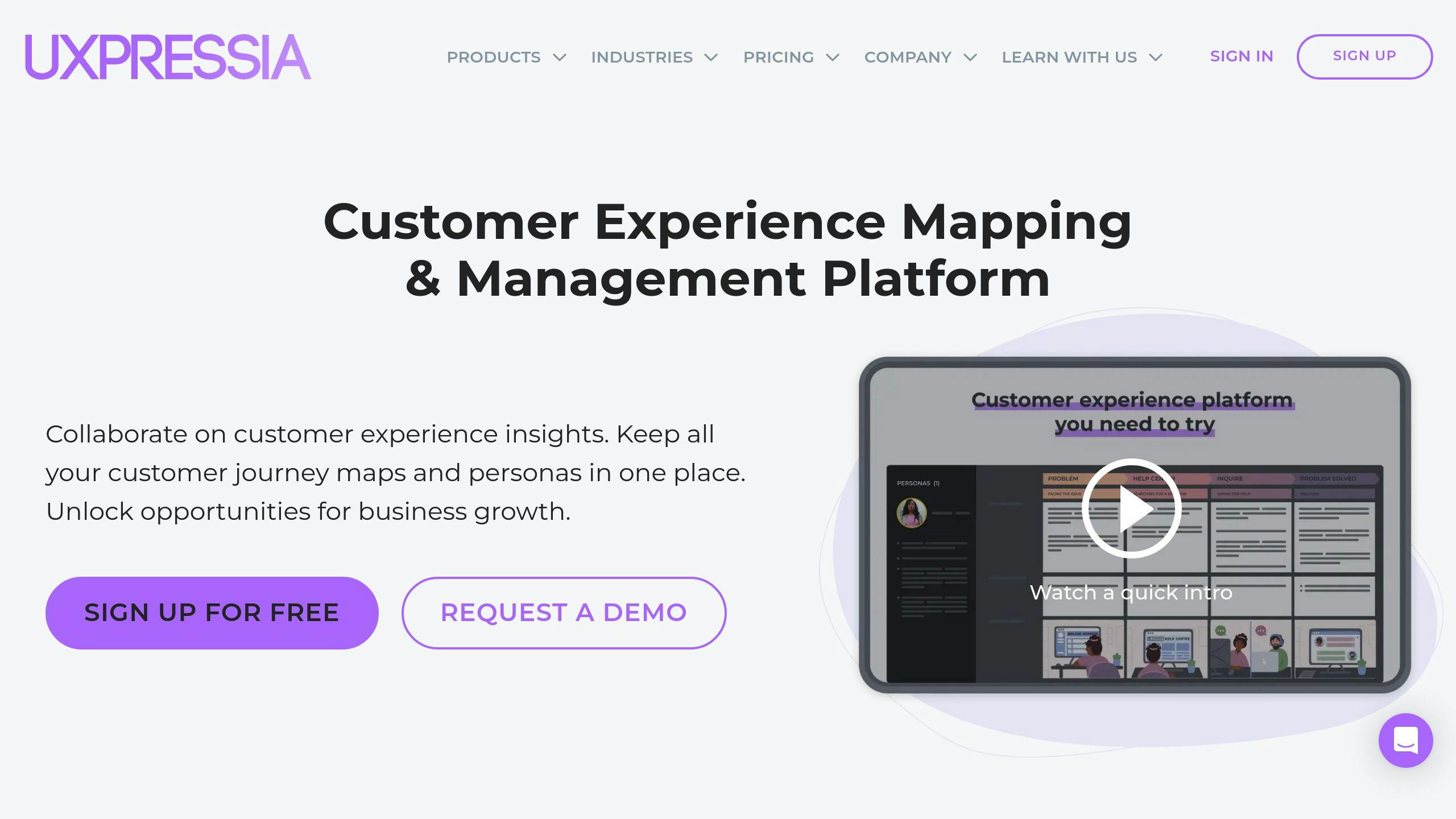
UXPressia is a customer journey mapping tool designed to make the process easy and collaborative. Its AI persona creator helps build detailed customer profiles quickly, while the platform’s user-friendly design ensures it's accessible to both beginners and experienced users.
With over 100 templates, UXPressia allows teams to get started on their journey mapping projects quickly and effectively.
One of its standout features is real-time collaboration, enabling multiple team members to work on the same journey map simultaneously. This feature is especially useful for remote teams or cross-departmental projects where input from various stakeholders is needed.
UXPressia integrates with several tools, including:
- Web analytics platforms
- Project management tools
- Mobile app tracking systems
Pricing Plans
Here’s a breakdown of UXPressia’s pricing options:
| Plan | Price (Annual Billing) Per User | Key Features |
|---|---|---|
| Free | $0 | Basic journey mapping, 1 user |
| Starter | $160/month | Multiple projects, team collaboration |
| Pro | $360/month | Advanced features, priority support |
| Enterprise | Custom pricing | Custom solutions, dedicated support |
For businesses focusing on improving customer experience, UXPressia also offers impact mapping to forecast customer interaction outcomes. Teams can map mobile touchpoints to get a full picture of the customer journey.
The platform includes detailed documentation and support resources to help users make the most of its features. With its mix of AI tools and collaboration options, UXPressia is a strong choice for marketing teams that rely on data and teamwork to create effective customer journey maps.
2. Smaply
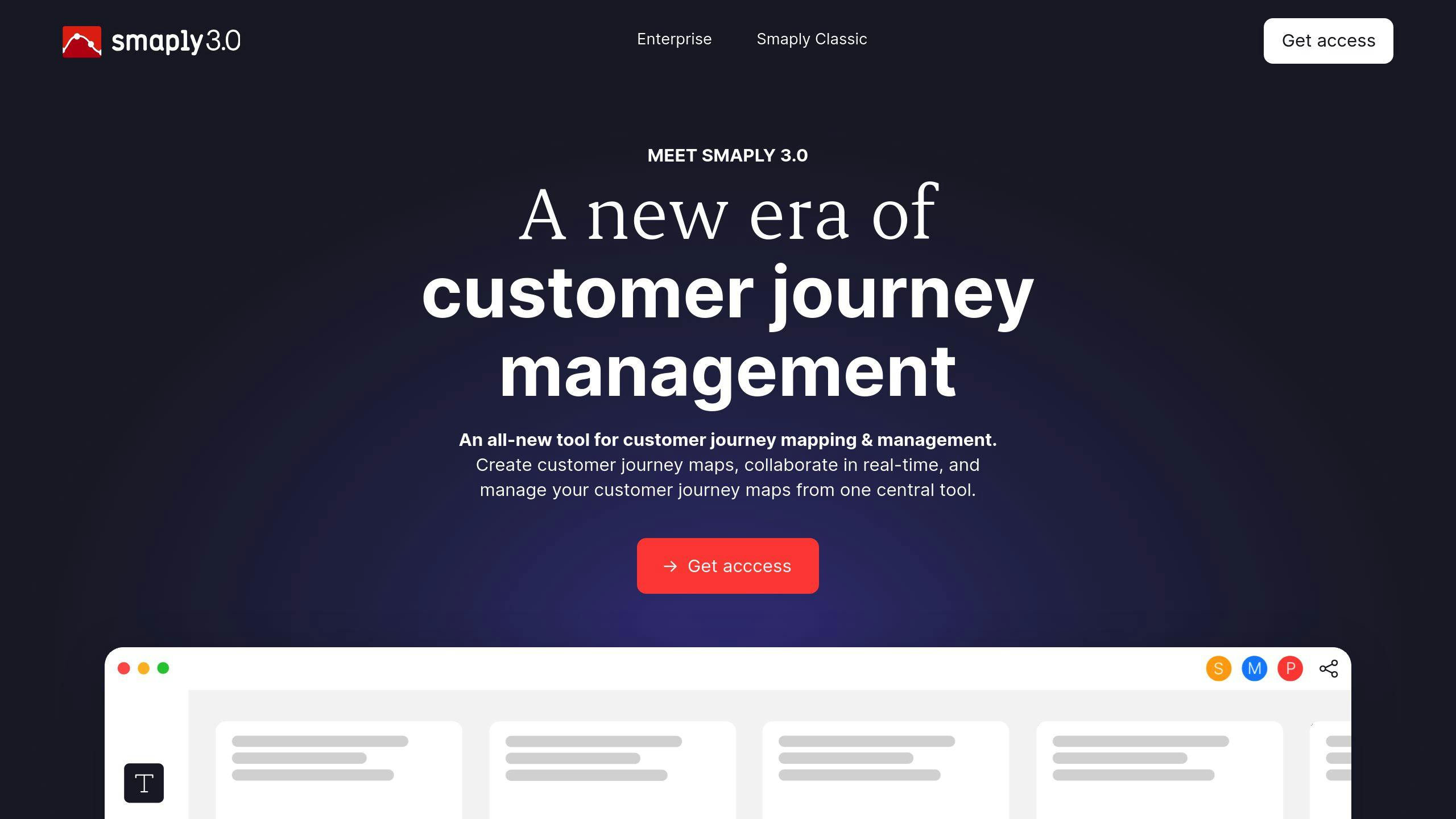
Smaply simplifies journey mapping with features like Smartly Capture and stakeholder visualization, making it a great choice for both small teams and larger organizations. It combines strong security measures, including GDPR compliance, with versatile mapping tools that cater to different business needs.
The Smartly Capture feature bridges the gap between analog and digital workflows by transforming hand-drawn maps into editable digital formats. Additionally, its stakeholder mapping tools provide detailed insights into customer relationships, helping businesses understand and manage diverse customer segments more effectively.
Smaply also allows teams to import journey maps from platforms like Miro and Mural, ensuring a smooth transition without disrupting productivity.
Pricing Structure
| Plan | Monthly Cost | Business Focus |
|---|---|---|
| Free | €0 | Basic needs, 3 journey maps |
| Repository | €390 | Team collaboration |
| Framework | €690 | Detailed mapping |
| Governance | €990 | Enterprise-level solutions |
Smaply emphasizes secure data handling while enabling collaboration across global teams. Some of its standout features include:
- Real-time collaboration with centralized map management
- Customizable templates for consistent mapping
- Advanced stakeholder visualization tools
- Strong security measures tailored for enterprise use
These tools make it easier for marketers to pinpoint and address customer challenges. Smaply's structured yet adaptable approach ensures businesses can maintain consistency while tailoring maps to their specific needs.
While Smaply shines in structured mapping and security, the next tool takes a more visually-driven approach to journey mapping.
3. Custellence
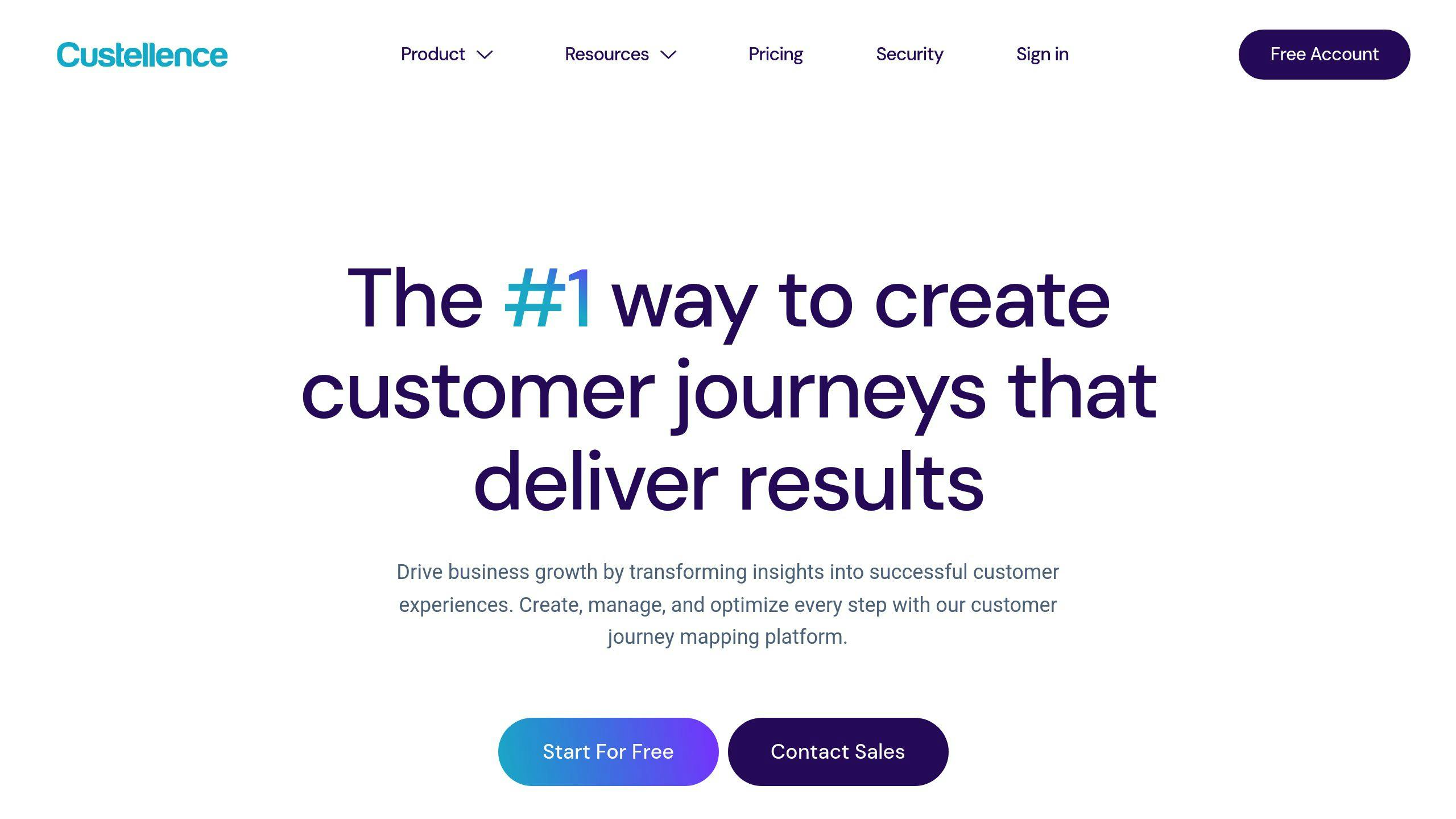
Custellence provides a drag-and-drop interface that simplifies managing complex customer journeys. With features like sub-lanes and detailed visual tools, it’s an excellent option for marketing teams looking to refine customer experiences using data insights.
The platform encourages teamwork with both real-time and asynchronous collaboration. Detailed activity logs maintain transparency and accountability throughout the mapping process.
Pricing Structure
| Plan | Cost | Key Features |
|---|---|---|
| Professional | $30/month | Team management, map hierarchies |
| Enterprise | Custom pricing | On-premise, dedicated success manager |
Custellence consistently receives ratings between 4.2 and 4.3 on platforms like G2 and Capterra, reflecting its reliability and user satisfaction.
It also includes customizable templates, allowing teams to jump into mapping quickly and tailor designs to fit their needs. The platform’s organized layouts are especially useful for enterprises juggling multiple customer journeys across various products or services. Additionally, its sharing options make it easy for teams across departments to collaborate on unified customer strategies.
Next, we’ll look at Milkymap, a tool that emphasizes visual clarity and team collaboration.
4. Milkymap
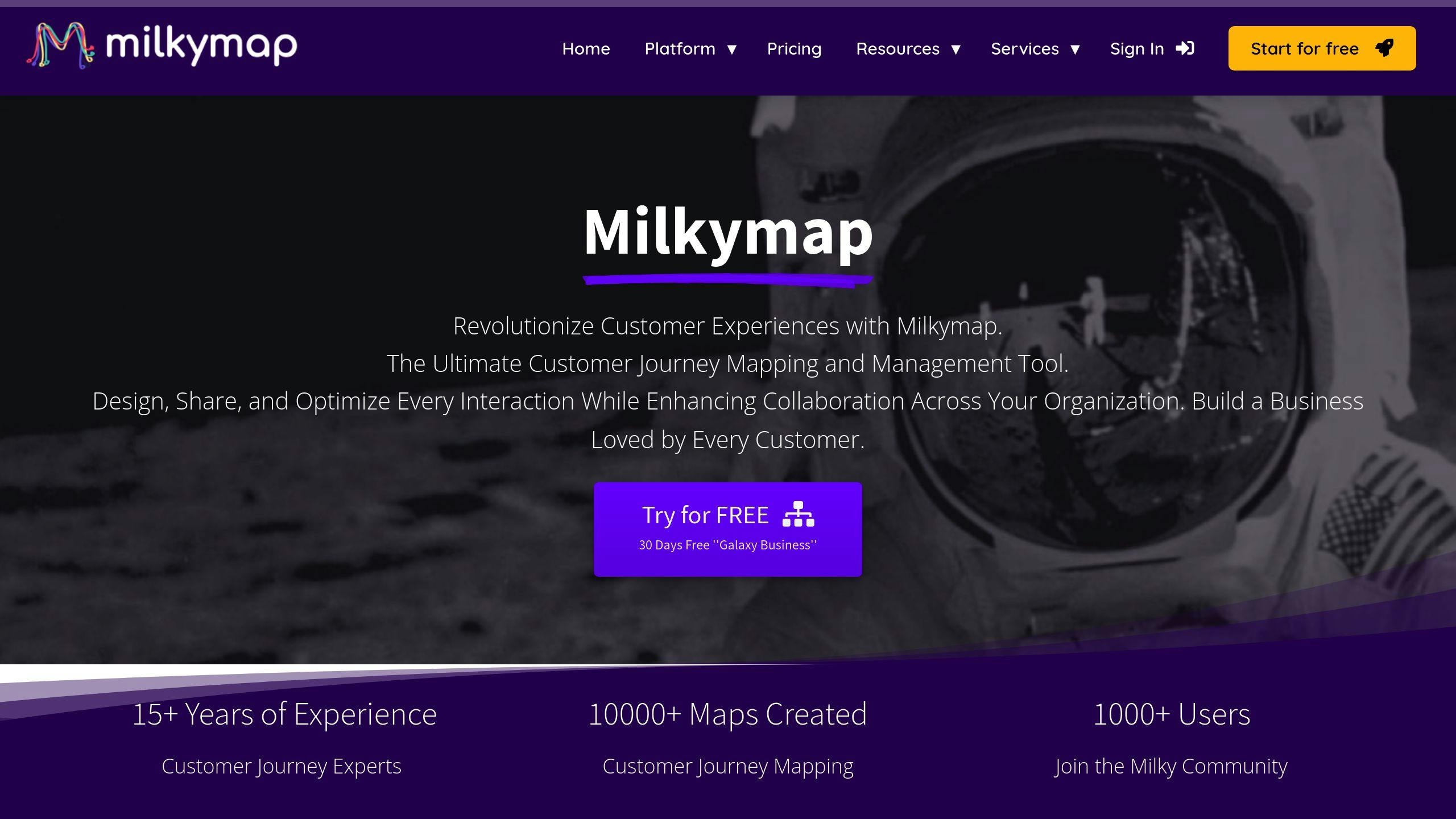
Milkymap is a user-friendly tool designed for customer journey mapping, focusing on simplicity and teamwork [3].
Key Features
Milkymap provides interactive templates and visual dashboards that make it easy for teams to create journey maps and understand user interactions [1]. The CX Life Cycle Model helps track customer touchpoints, making it easier to spot and address issues, ultimately boosting satisfaction and loyalty.
| Feature Category | Capabilities |
|---|---|
| Mapping Tools | Interactive templates, Visual dashboards, Export options |
| Collaboration | Sharable templates, Team workspace, Real-time editing |
| Integration | API connectors, Data-driven CX management |
| Analytics | User interaction tracking, Journey insights |
Pricing Structure
Milkymap has a free plan for basic use, with paid subscriptions starting at $10 per month. An annual plan is available for €99 [1].
Integration Capabilities
Milkymap connects with CRM systems, analytics platforms, and customer feedback tools through its API connectors. This integration supports data-driven strategies by incorporating real user behavior and interactions [3].
While Milkymap is perfect for simpler mapping needs, it may lack the customization required for highly complex journeys [1]. Its emphasis on collaboration makes it an excellent choice for teams looking for straightforward tools.
If you're seeking broader diagramming options, the next tool, Lucidchart, might be a better fit.
5. Lucidchart

Lucidchart is a tool that blends diagramming features with customer journey mapping, making it an excellent option for teams aiming to better understand and improve customer experiences.
Features and Tools
Lucidchart offers an easy-to-use interface with pre-designed journey mapping templates and collaboration tools. Teams can edit maps together in real-time, use @mentions, and leave comments to streamline discussions. Plus, its data visualization tools help turn customer analytics into actionable steps.
| Category | Features |
|---|---|
| Core Tools | Journey mapping templates, Data visualization |
| Collaboration | Real-time editing, Comments, @mentions |
| Integrations | Compatible with major productivity tools |
| Analytics | Customer behavior tracking, Journey insights |
Pricing and Integrations
Lucidchart provides a free plan for basic usage, with premium plans starting at $7.95/month for individuals. Enterprise solutions are available at custom pricing. It integrates with popular workplace tools, making it easier to incorporate journey maps into your existing workflows.
Focus on Data-Driven Mapping
One standout feature is Lucidchart's ability to display customer data directly within diagrams. This makes it easier to spot trends and refine customer interactions. Teams can use these insights to make smarter decisions about improving the customer experience.
While Lucidchart is a strong choice for its flexibility and integrations, companies looking for more advanced customer experience solutions might want to explore Adobe Experience Cloud's Journey Optimizer.
sbb-itb-5174ba0
6. Glassbox
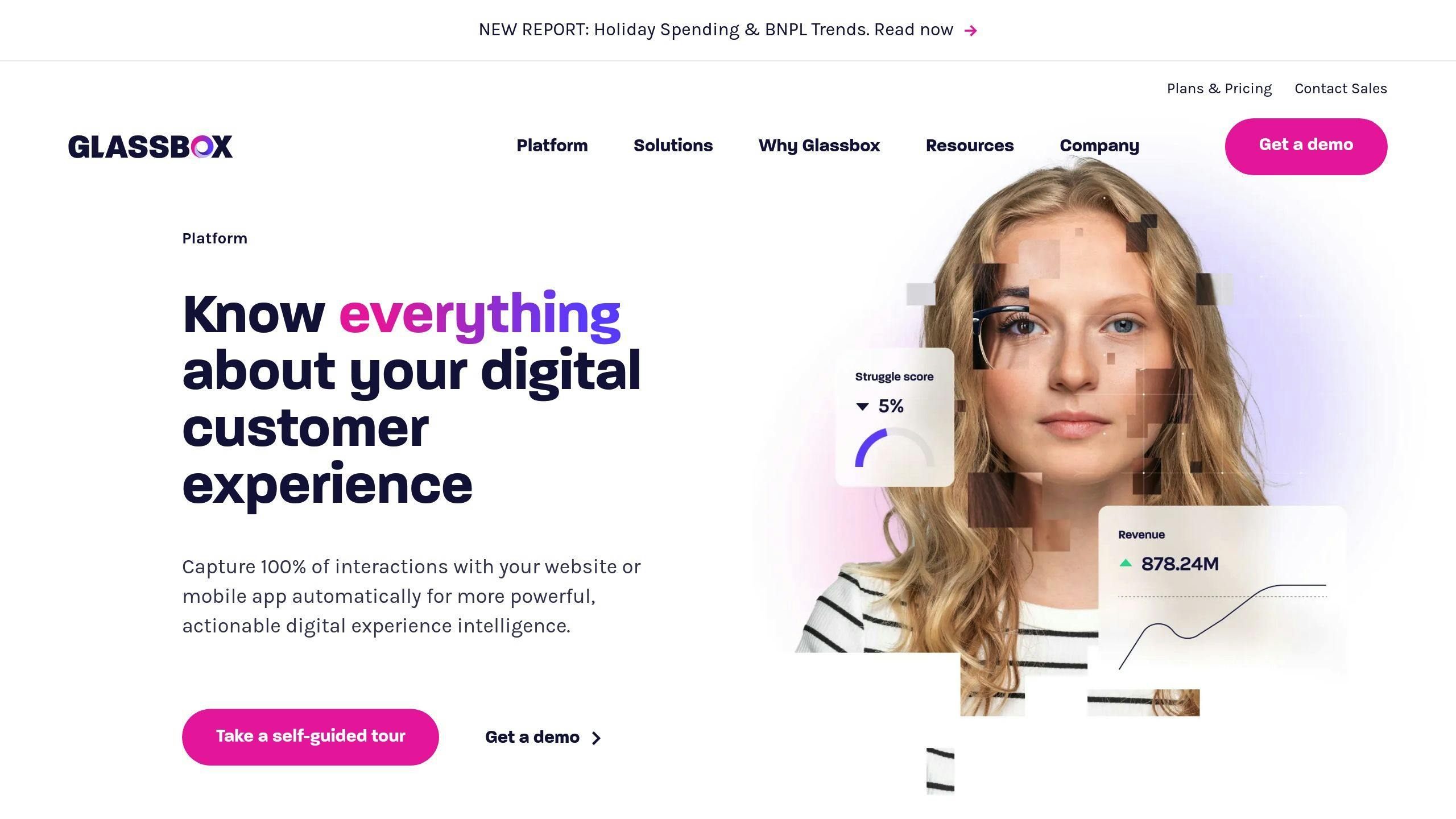
Glassbox uses AI and real-time data to improve every stage of the customer journey. Its standout feature is its ability to provide deep analytics and actionable insights, making it a top choice for businesses looking to enhance customer interactions across multiple channels.
Core Features
Glassbox offers tools like session replay, heat maps, and AI-powered insights to pinpoint and address customer challenges as they happen. Its automated analysis helps teams quickly identify areas for improvement.
| Feature Category | Capabilities |
|---|---|
| Analytics Tools | Session replay, Heat maps, Click maps |
| Real-time Monitoring | Live interaction tracking, Instant alerts |
| Data Analysis | AI insights, Behavioral analytics |
| Collaboration | Team sharing, Centralized dashboard |
Integration Capabilities
The platform integrates smoothly with leading CRM systems and marketing automation tools. Its AI-driven approach detects friction points in real time, delivering insights that teams can act on immediately.
Real-World Impact
Glassbox enabled an e-commerce brand to raise conversions by 20% after resolving key bottlenecks in the customer journey. Across industries, users have reported a 15% increase in customer satisfaction thanks to its tools.
Enterprise Focus
Glassbox operates on a custom pricing model, catering primarily to enterprises managing complex customer interactions. It consistently holds a 4.5/5 star rating on platforms like G2, Capterra, and GetApp. Users often highlight its detailed analytics and user-friendly interface as standout features. However, smaller businesses may find its enterprise-oriented pricing and features better suited for larger-scale operations.
For businesses exploring additional customer experience tools, Microsoft Dynamics 365 Customer Insights can serve as a complementary option for journey optimization.
7. Microsoft Dynamics 365 Customer Insights
Microsoft Dynamics 365 Customer Insights offers tools for mapping and refining customer journeys. By integrating with Microsoft tools, it uses AI to provide actionable insights into customer behavior.
Core Features
This platform brings together customer data from various channels, offering a unified view. Its predictive analytics help businesses identify trends, address customer needs, and reduce churn risks.
| Feature Category | Capabilities |
|---|---|
| Journey Mapping & Data Integration | Unified customer profiles, Multi-channel tracking |
| AI Capabilities | Predictive insights, Churn reduction |
| Segmentation | Dynamic customer grouping, Behavioral targeting |
Integration Ecosystem
One of its key strengths is how well it works with other Microsoft products like Office 365 and Azure. This compatibility allows businesses to use familiar tools while improving their approach to customer journey management.
Real-World Impact
A large retail company used this platform to boost customer satisfaction by 20% and cut churn by 15% in just six months.
Enterprise Considerations
| Component | Details |
|---|---|
| Base Platform | Pricing varies based on data volume |
| Integration Services | Additional fees for custom integrations |
For companies managing customer relationships across multiple channels, Microsoft Dynamics 365 Customer Insights delivers comprehensive tools for journey mapping. Its AI-powered features make it particularly useful for creating data-driven customer experiences.
To make the most of this platform, businesses should focus on data integration, team training, and continuous monitoring of customer journeys.
For those exploring alternatives, Adobe Experience Cloud's Journey Optimizer is another strong option for advanced journey management within a larger enterprise framework.
8. Adobe Experience Cloud's Journey Optimizer
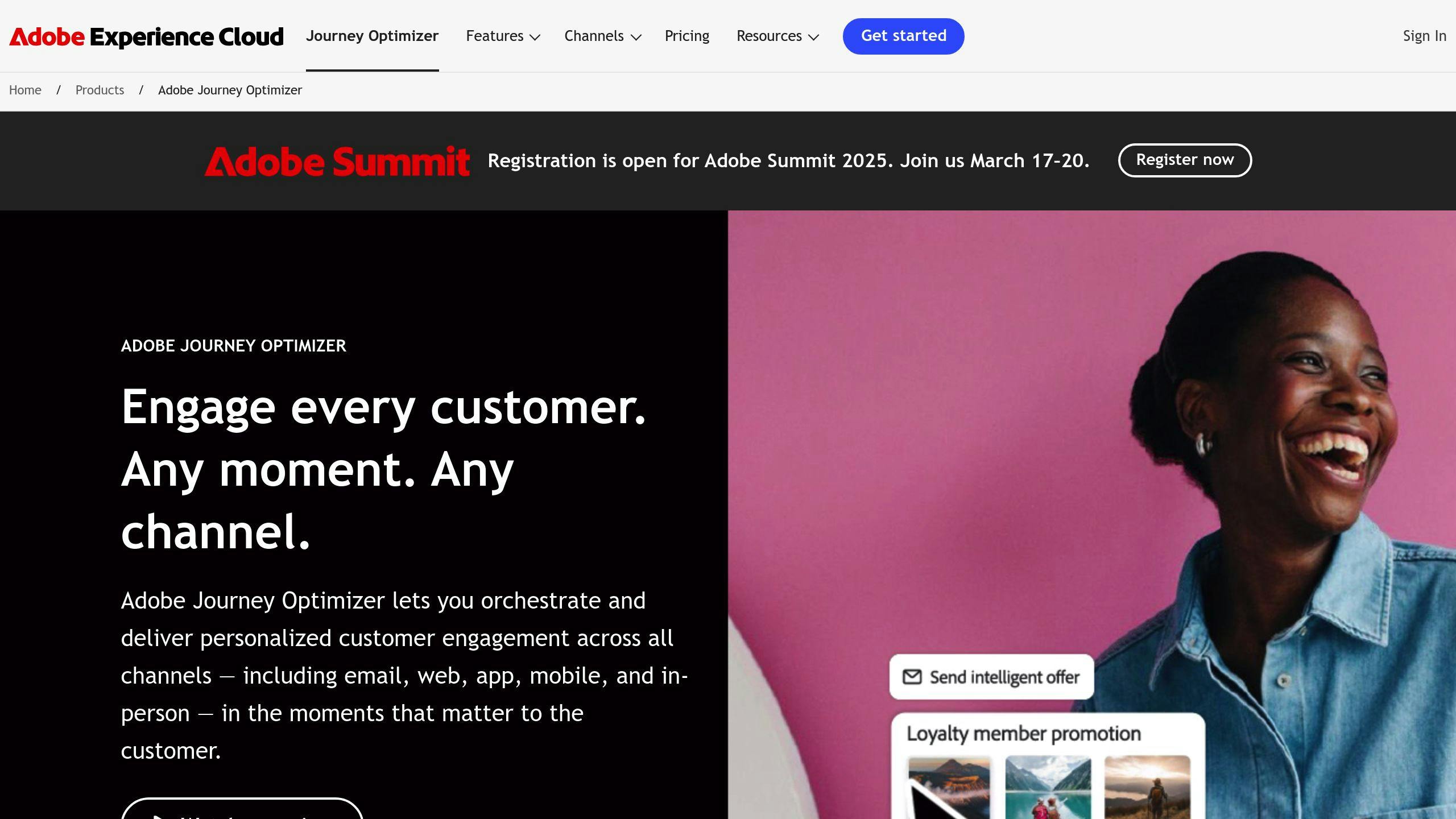
Adobe Experience Cloud's Journey Optimizer is designed for businesses looking to manage and refine customer journeys across multiple channels. This AI-powered tool focuses on crafting seamless customer experiences by combining real-time data with advanced analytics.
Key Features for Journey Mapping
This platform uses real-time data and AI to build dynamic customer journey maps. It helps businesses track and improve interactions across multiple touchpoints, offering a clear view of how customers engage with their brand.
| Feature Category | Capabilities |
|---|---|
| Journey Design | Multi-channel mapping, Real-time visualization |
| AI Integration | Predictive analytics, Behavioral insights |
| Data Management | Real-time data integration and cross-channel tracking |
Integration with Adobe Tools
One of Journey Optimizer's strengths is its ability to work seamlessly with Adobe Analytics and Adobe Campaign. This integration allows businesses to manage customer experiences more efficiently, using AI to predict behaviors and adjust journeys accordingly.
Real-World Results
For example, a major retailer used Journey Optimizer to create personalized, multi-channel campaigns. The result? A 25% increase in customer engagement and a 15% boost in overall revenue.
Collaboration and Workflow Tools
The platform also supports real-time editing and shared workspaces, making it easier for teams to collaborate across departments.
Considerations for Enterprises
| Component | Details |
|---|---|
| Pricing Model | Custom enterprise pricing |
| Implementation & Support | Includes training resources and dedicated support teams |
| Integration Costs | Depends on existing Adobe suite usage |
Journey Optimizer is a strong fit for large organizations already using Adobe tools. However, its pricing and advanced features might not align with the needs of smaller businesses or those with simpler requirements.
For those seeking a more straightforward solution, tools like Miro can provide a simpler starting point for journey mapping.
9. SuiteCX
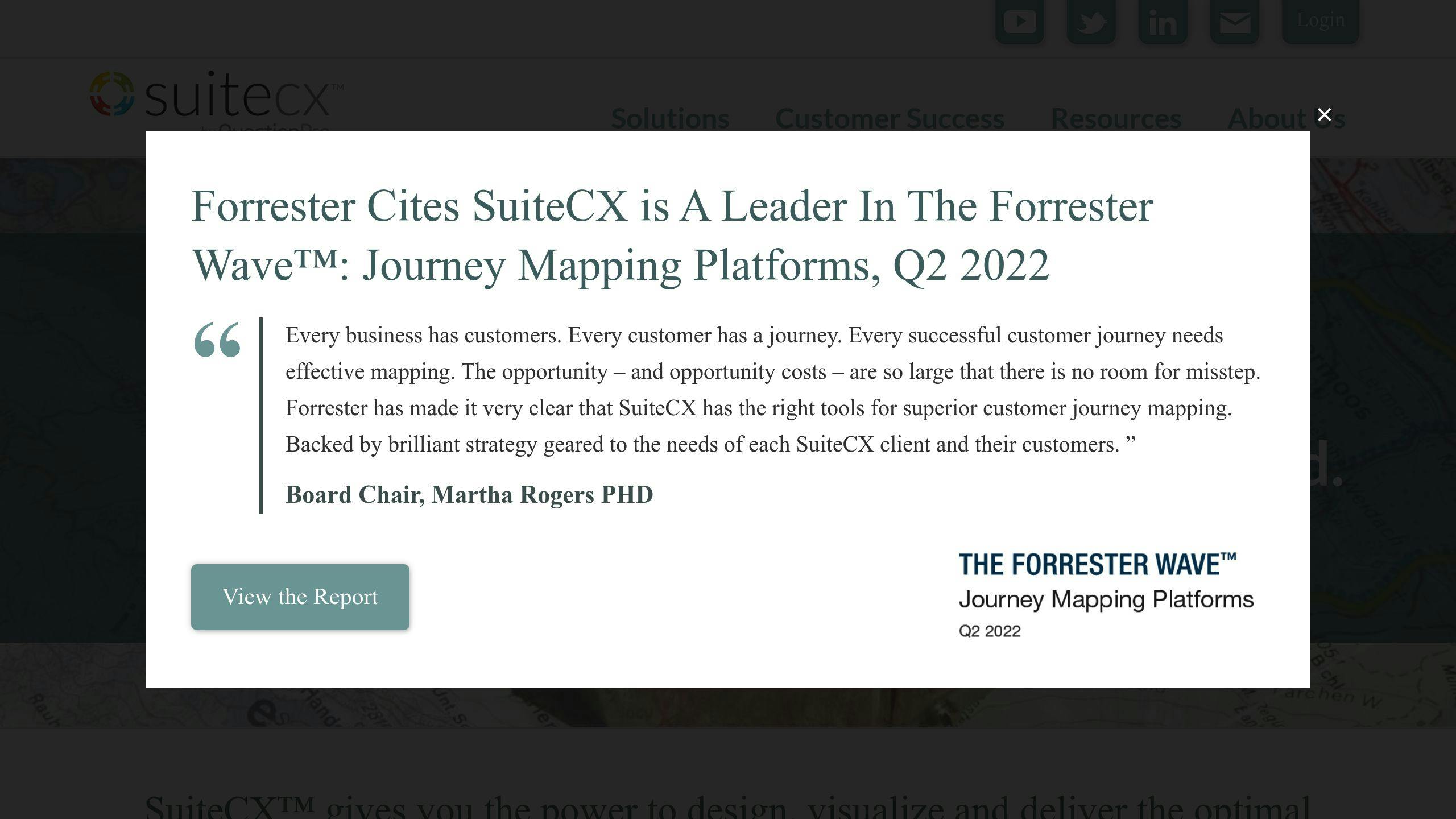
SuiteCX is a high-level platform designed for comprehensive journey mapping and customer interaction analysis across various touchpoints.
Key Features for Journey Mapping
| Feature Category | Capabilities |
|---|---|
| Mapping Tools | Customizable maps, Multi-touchpoint views |
| Analytics | User interaction tracking, Behavioral insights |
| Workflow Management | Process management, Team collaboration |
| Real-time Features | Real-time updates, Collaborative editing |
Collaboration Tools for Enterprises
SuiteCX brings teams together with its collaborative features, allowing different departments to work on journey maps simultaneously. Its built-in workflow management ensures smooth version control and streamlines the approval process, making it easier to maintain consistency across strategies.
Tailored for Large-Scale Businesses
Unlike tools like UXPressia or Smaply, SuiteCX is aimed at larger organizations. It’s built to handle:
- Detailed journey analysis and complex mapping for enterprise-level projects
- Broad experience management capabilities
- Cross-department collaboration for unified strategies
Pricing Details
SuiteCX uses a custom pricing model, tailored to the specific needs of each business.
Drawbacks and Integration Options
While SuiteCX integrates with existing business systems, its options are more limited compared to platforms such as Adobe Experience Cloud. Its enterprise focus and custom pricing may also make it less suitable for smaller businesses.
For companies looking for tools with extensive analytics integration, the Marketing Analytics Tools Directory offers additional options to complement SuiteCX. On the other hand, if you’re after a simpler, more flexible tool, Miro provides an easier approach to journey mapping.
10. Miro
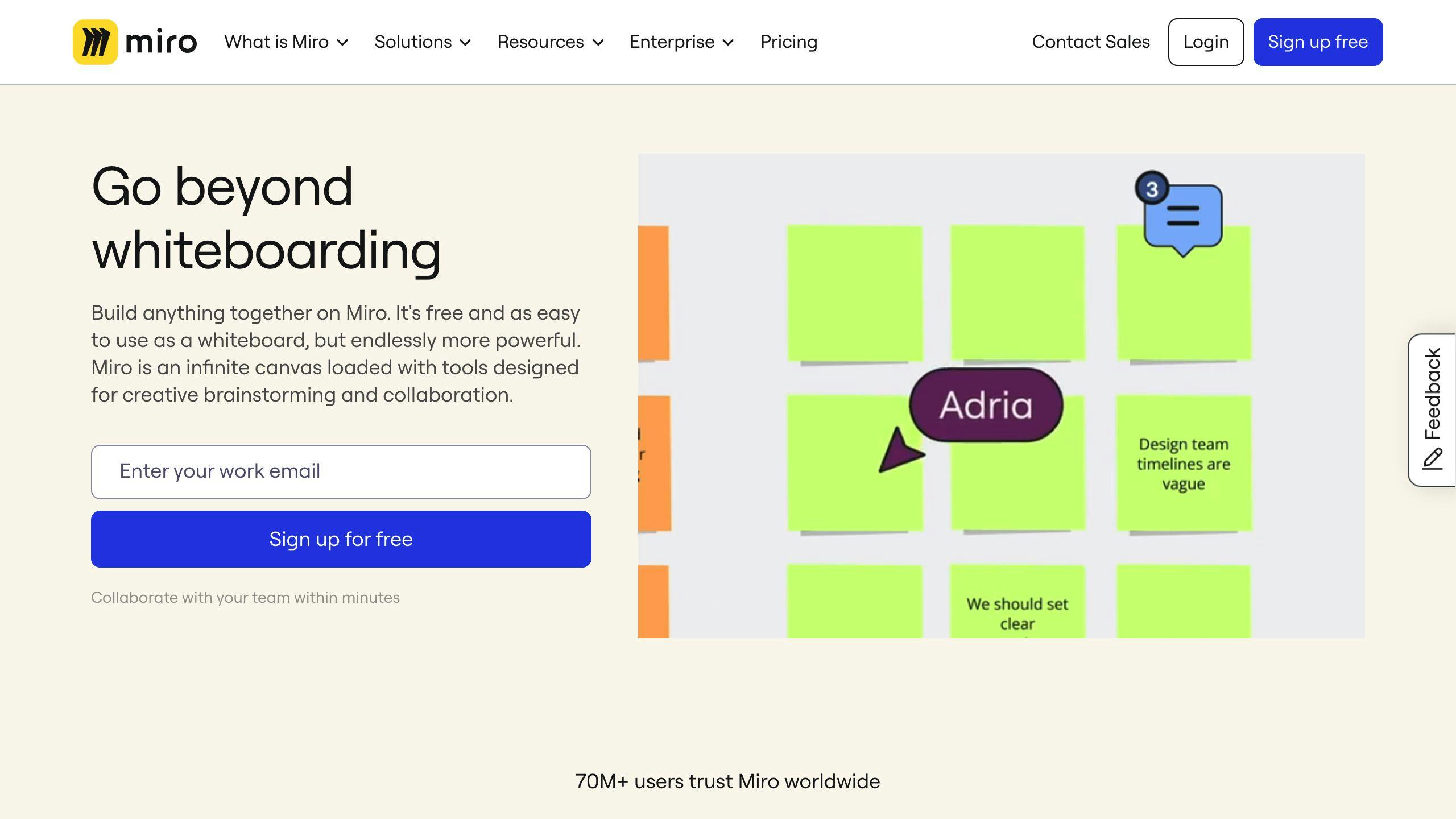
Miro is a collaborative platform that combines visual workspace tools with customer journey mapping capabilities. While it’s not exclusively designed for journey mapping, its customizable templates and visual tools make it a practical choice for teams looking to map customer journeys effectively.
Key Features for Journey Mapping
| Feature Category | Capabilities |
|---|---|
| Mapping Tools | Pre-designed templates, drag-and-drop interface, and visual collaboration |
| Team Features | Real-time editing, live comments, and @mentions |
| Integration Support | Connects with Jira, Asana, Figma, and Google Drive |
| Version Control | History tracking and change management |
Collaboration Made Easy
Miro’s real-time collaboration tools let teams work together on maps, add feedback directly, and track updates with version history. This is especially helpful for remote teams working across time zones.
Seamless Integrations
Miro works with popular tools like Jira, Asana, Figma, Google Drive, and Slack. These integrations make it simple to incorporate journey mapping into your existing workflows.
Pricing
Miro offers a free plan, with paid plans starting at $8 per user per month (Starter) and $16 per user per month (Business). Enterprise pricing is available upon request.
Things to Keep in Mind
While Miro is great for general-purpose collaboration, it lacks advanced journey mapping features like automated insights or persona creation. Teams may need to manually customize its tools to achieve these functionalities.
For teams looking for more specialized analytics features, the Marketing Analytics Tools Directory can help identify tools to complement Miro’s capabilities.
Miro’s ease of use and integration options make it a solid choice for teams focused on collaboration, even if it doesn’t offer some of the advanced features found in dedicated journey mapping tools.
Comparison Table
Here's a breakdown of the top 10 customer journey mapping tools for 2025, highlighting their core features, collaboration options, integrations, and pricing.
| Tool Name | Journey Mapping Features | Collaboration Tools | Integrations | Pricing |
|---|---|---|---|---|
| UXPressia | • Dynamic mapping • AI personas • Impact analysis |
• Real-time team collaboration | Multiple integrations | Free and custom plans |
| Smaply | • Journey mapping • Stakeholder mapping • Persona creation |
• Team collaboration | Business tool integrations | Free and paid plans |
| Custellence | • Custom templates • Map hierarchies • Advanced mapping |
• Team management | Platform integrations | Free and professional plans |
| Milkymap | • User-friendly mapping • Template library |
• Basic collaboration | Limited integrations | Pricing upon request |
| Lucidchart | • Visual diagramming • Journey visualization |
• Real-time collaboration | Broad integrations | Free and paid tiers |
| Glassbox | • Real-time analytics • Customer insights |
• Real-time collaboration and shared dashboards | Enterprise integrations | Custom enterprise pricing |
| Microsoft Dynamics 365 | • Data-driven insights • AI analytics |
• Enterprise collaboration | Microsoft ecosystem | Enterprise pricing |
| Adobe Experience Cloud | • Multi-channel mapping and analytics • Personalization |
• Team workflows | Adobe suite integration | Enterprise pricing |
| SuiteCX | • Customizable multi-touchpoint maps • Journey analytics |
• Team collaboration | Enterprise integrations | Pricing upon request |
| Miro | • Visual journey mapping • Template library |
• Real-time collaboration • Comments & mentions |
Project management tools | Free and paid plans |
Ratings from popular review platforms show Smaply leading with a 4.4/5 on Capterra and 4.6/5 on G2 [2], while Custellence closely follows with 4.3/5 on Capterra and 4.2/5 on G2 [2].
For deeper analytics needs, the Marketing Analytics Tools Directory provides detailed comparisons of related solutions.
This table serves as a quick reference to help businesses identify the tool that best matches their goals and resources.
Conclusion
Platforms like UXPressia and Smaply address the needs of various teams, while options like Microsoft Dynamics 365 and Adobe Experience Cloud offer more advanced features for larger, more complex operations. In 2025, AI-powered mapping tools with automated visualization and analytics are becoming increasingly popular.
When choosing a tool, consider factors like integration, collaboration features, pricing, and scalability. Make sure it fits your team size, budget, and workflow. As customer expectations and technology continue to shift, these tools are built to handle the evolving challenges ahead.
For those interested in deeper analytics integration, check out the Marketing Analytics Tools Directory. Keep in mind, the ideal tool isn’t the one with the most features, but the one that aligns with your specific goals and organizational needs.
Make use of free trials and demos to test how well a tool works for you. Use the comparison table above to pinpoint the option that matches your requirements.


